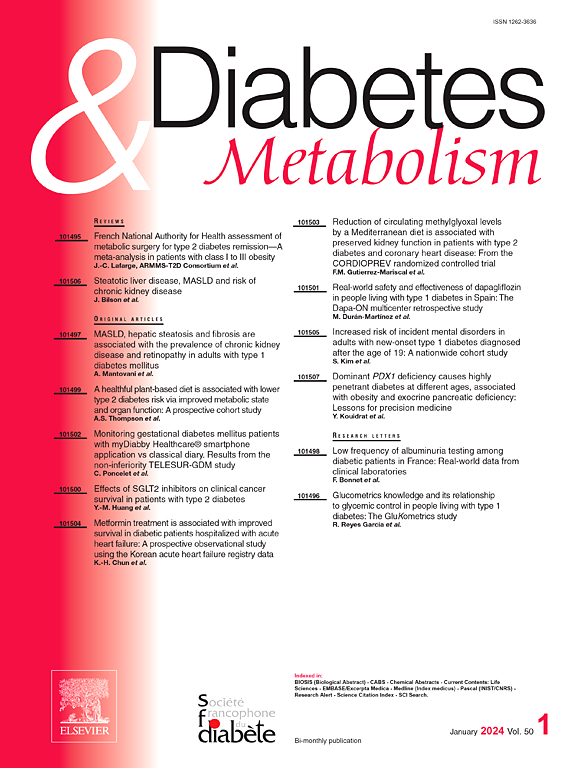载脂蛋白翻译后修饰作为糖尿病相关心血管疾病有前景的生物标志物:综述
IF 4.7
2区 医学
Q1 ENDOCRINOLOGY & METABOLISM
引用次数: 0
摘要
脂蛋白是载脂蛋白和脂质的生化复合物,主要介导脂质的循环运输,从吸收或合成点到使用、储存或排泄点。在2型糖尿病(T2D)中,脂蛋白代谢紊乱是并发症的关键驱动因素,也是动脉粥样硬化性心血管疾病(ASCVD)的重要诱因。因此,ASCVD仍然是T2D患者死亡的主要原因,其患病率明显高于非糖尿病患者。蛋白质翻译后修饰(PTMs)已成为器官衰竭机制的关键因素,特定的PTMs与T2D的发病机制密切相关。一些报告也强调了血浆载脂蛋白在心血管代谢疾病ASCVD早期预测中的价值。因此,载脂蛋白,特别是其结构翻译后修饰形式,为脂蛋白功能障碍的分子机制提供了新的见解,并可能增强T2D中ASCVD风险分层的特异性。本文概述了在T2D中发现的主要载脂蛋白PTMs,其中许多现在可以在生物样品中定量,特别是通过质谱法。我们还讨论了它们在脂蛋白代谢功能障碍中的作用,以及它们在评估T2D患者ASCVD风险方面的潜在价值,强调了它们在基于人群的队列研究中作为临床生物标志物的潜力。本文章由计算机程序翻译,如有差异,请以英文原文为准。
Post-translational modifications of apolipoproteins as promising biomarkers for diabetes-related cardiovascular diseases: A comprehensive review
Lipoproteins are biochemical complexes of apolipoproteins and lipids that primarily mediate the transport of lipids through the circulation, from sites of absorption or synthesis to those of use, storage, or excretion. In type 2 diabetes (T2D), disruptions in lipoprotein metabolism are key drivers of complications and strongly contribute to atherosclerotic cardiovascular disease (ASCVD). As a result, ASCVD remains the leading cause of death in T2D, with significantly higher prevalence than in non-diabetic individuals. Protein post-translational modifications (PTMs) have emerged as key contributors to organ failure mechanisms, with specific PTMs closely linked to the pathogenesis of T2D. Several reports also emphasized the value of plasma apolipoproteins for the early prediction of ASCVD in cardiometabolic diseases. Thus, apolipoproteins, and especially their structurally post-translational modified forms, offer new insights into the molecular mechanisms of lipoprotein dysfunction and may enhance the specificity of ASCVD risk stratification in T2D. This review outlines major apolipoprotein PTMs identified in T2D, many of which can now be quantified in biological samples, particularly via mass spectrometry. We also discuss their role in lipoprotein metabolism dysfunction and their potential value in assessing ASCVD risk in T2D, highlighting their growing potential as clinical biomarkers in population-based cohort studies.
求助全文
通过发布文献求助,成功后即可免费获取论文全文。
去求助
来源期刊

Diabetes & metabolism
医学-内分泌学与代谢
CiteScore
12.00
自引率
4.20%
发文量
86
审稿时长
13 days
期刊介绍:
A high quality scientific journal with an international readership
Official publication of the SFD, Diabetes & Metabolism, publishes high-quality papers by leading teams, forming a close link between hospital and research units. Diabetes & Metabolism is published in English language and is indexed in all major databases with its impact factor constantly progressing.
Diabetes & Metabolism contains original articles, short reports and comprehensive reviews.
 求助内容:
求助内容: 应助结果提醒方式:
应助结果提醒方式:


